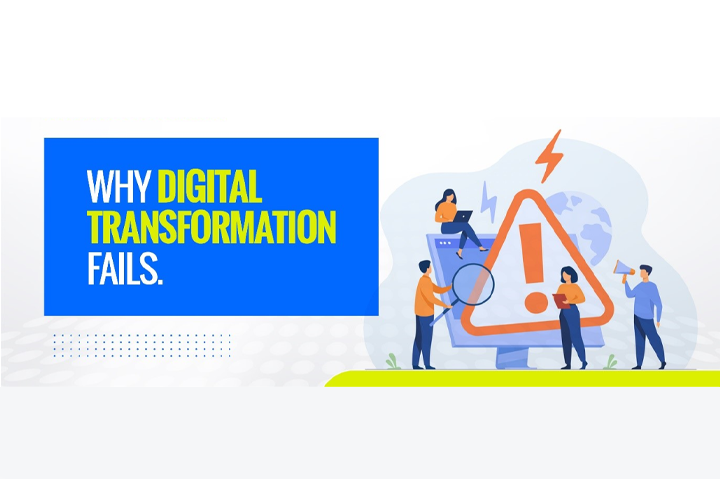
Why Digital Transformation Fails ?
Published on July 28, 2022
While Digital Transformation is the need of the hour, especially with the right push provided by the pandemic, 78% of organizations fail in their digitization initiative journey, for reasons being false projected ROI, limited user application, and abandoned projects due to hidden costs.
Organizations need to create a culture where frequent improvements happen and where all the involved stakeholders are open and comfortable with ongoing change. All those involved must be willing to identify and abandon outdated and ineffective processes.
The most common reason for failure of organizations due to internal resistance could be identified as:
· Inadequate engagement and lack of support from employees
· Lack of accountability
· immature digital culture
· Lack of training and skill advancements
· Reluctance to replace the old system
· Slow decision making and bureaucracy
· Conducting digitalization too fast
· Internal resistance, non-cooperation, and fear of losing the job
Without considering cultural requirements, an organization could end up with modern technologies that enable more efficient processes, but without truly transforming how the organization operates from within.
In the run to achieve efficiency, and boost profit margins and productivity, approximately 70% of digitalization projects fail, even when aligned with company leadership. throughout the process of digital transformation and ERP projects, there are a lot of failures, and the following may be a few reasons:
1. Absence of right data in right place: Due to covid-19 digital acceleration, it is not possible to get the right data to the right place, as data is distributed across clouds, devices, and machines. Also, with the regular project and collaboration tools, the transparency and accountability needed for onboarding and implementation of projects are missing.
2. Lack of expertise: companies that go through digital transformation do not necessarily have to be experienced. However, to make the digital transformation process successful, companies without any expertise have to seek advice from external experts. One might benefit from hiring strategists, innovators, experienced professionals, and technical experts.
3. Not keeping up with the competitors: Market research should be conducted before taking up the digitalization process. This helps to understand the competitors and the market requirements. Analysis of this crucial information allows the management to make plans and changes to the existing business strategy.
4. Utilizing outdated technology: One reason digital transformation projects fail is outdated technology. The technology should form a coalition between sales and marketing teams, driving results with all the tools, services, and analytics needed to execute larger organizational strategies. The technology should include all aspects of the organization and should be unique to every business.
5. Not understanding the customer requirements: business owners must align with the interests of the customers. Digitalization is no good if it does not meet the client’s requirements. Companies should include customers in their digital transformation strategy. If digitalization does not impress the consumers, is not user friendly, and make a positive impact, the consumer will simply look elsewhere.
Another major reason that companies have faced during the digitalization process, is giving up on quality and losing the motive while on the go. Companies also tend to miscommunicate the goals, which leads to misunderstanding and solutions not being capable to meet the outcome.
A few epic failure examples that one can learn from are:
Nike spent $400 million to upgrade their ERP system recently. It did not go well for the company and they had to take a loss of about $100 million, with a stock price drop of 20%.
GE, Ford, and P&G faced failure. The biggest reason being inefficiency to communicate their goals, strategy, purpose, and outlook with their employees.
As per surveys, 71% of organizations have survived the pandemic through rapid digitization. However, the process needs to be seamless considering all aspects of business and considering those making a business successful.